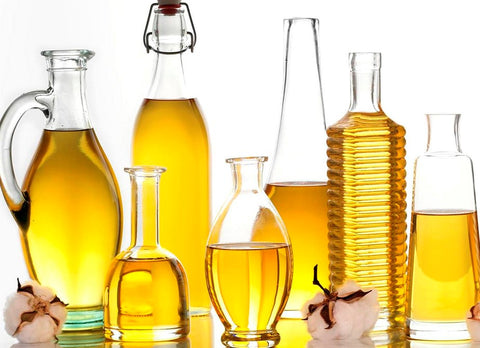Fats & Oils at Red Plate

Red Plate has passionate customers, and we LOVE that about you! Among the questions we hear at tastings and through the website, the one about our choice of fats and oils comes up frequently, so a blog post seemed in order.
Rest assured, much thought has been put into creating the Red Plate recipes. We are committed to using high quality ingredients that we can source safely (no allergen cross contamination) and sustainably from reliable suppliers, and keep the price of the products within reach.
Palm Kernel Oil vs. Coconut Oil
I use coconut oil daily in my home kitchen and agree it’s a healthy choice. The issue with using it for Red Plate Foods is that coconut is classified as a tree nut by the FDA, although botanists consider coconut a “fibrous, one-seeded drupe”. Unfortunately, it can cause food allergy issues for our nut allergic customers who cross-react to it. Even having it in the commercial kitchen would pose a danger to those individuals, so it is not possible for us to use coconut in any form in our products.
Instead, we replace the butter in traditional recipes with organic palm kernel oil. While there is much debate on the appropriate amount of saturated fat in our diets, palm kernel oil is similar to coconut in that is it a medium chain fatty acid and in particular, palm kernel oil contains 48% lauric acid compared to 50% in coconut oil.
Read More: Palm Oil – Healthy and Sustainable?
Sustainability is high on our list of priorities, and we keep that in mind when purchasing palm kernel oil. Our company buys from a source that holds a sustainability certification and derives their product from Columbia which is not native habitat for orangutans. Information on the organization that provides their certification is located at Roundtable on Sustainable Palm Oil.
Canola vs. Olive Oil
The reason we use canola instead of olive oil is the higher smoke point. Olive oil will not tolerate some of the temperatures at which our products bake, potentially causing the oil to change from containing antioxidants to containing free radicals. Here is an article with more information: http://www.lewisnaturalhealth.com/articles/general-articles/confused-about-cooking-oils-part-1. The canola oil we source is expeller pressed and certified non-GMO, so we have made the decision to spend more money in favor of a higher quality canola oil.
